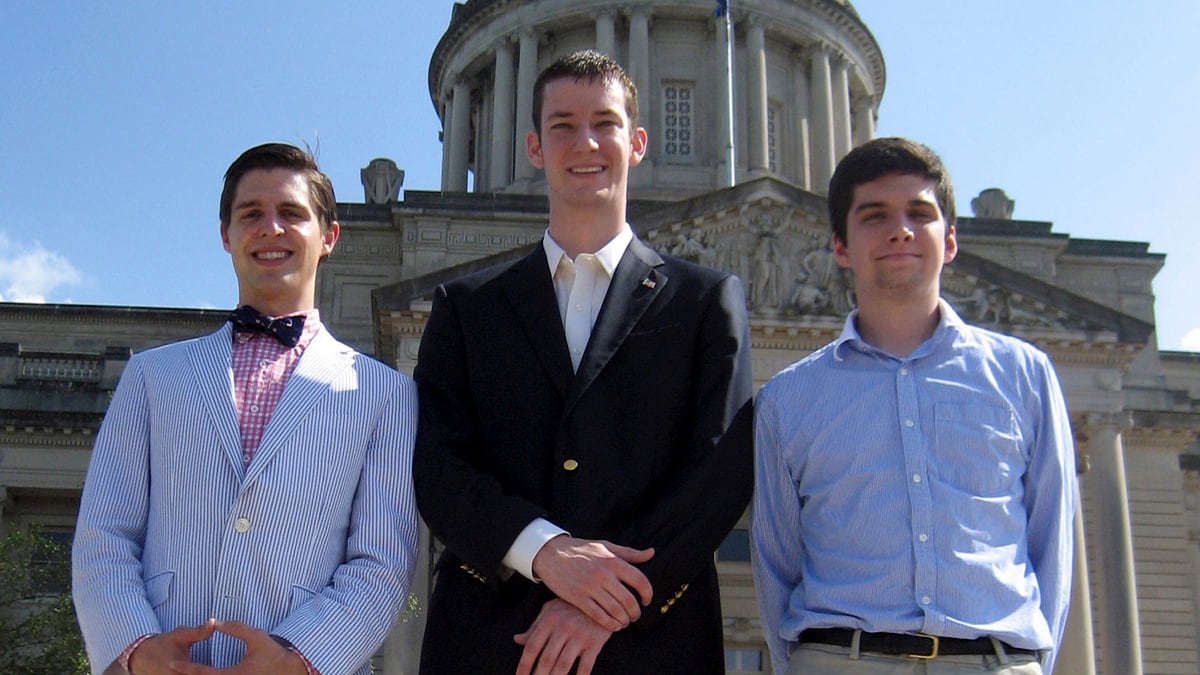In the hard-fought race to represent Michigan’s 11th Congressional District, Democrat Syed Taj is taking on a kid.
Technically, his opponent is Kerry Bentivolio, the 60-year-old Republican contender who won a primary to fill the seat of Thaddeus McCotter, the GOP congressman who served for close to three decades before resigning in July after a scandal involving fraudulent primary signatures.
But when Taj looks at Bentivolio, he sees John Ramsey, a 21-year-old millionaire. Ramsey, who is finishing his undergraduate degree through online courses at Stephen F. Austin University in Texas, has poured $2.7 million of an inherited fortune into Liberty for All, the super PAC he cofounded in late 2011. LFA has already worked on the election of one Republican congressman, Thomas Massie, who won a primary election in Kentucky, and has so far plowed more than $660,000 into helping Bentivolio.
There are no published polls of the race for the 11th Congressional District, but Thomas Kerr, a local political operative who has worked mostly with Democrats, says the race is “neck and neck” and that Bentivolio would “definitely not” be putting up such a strong fight were it not for the outside money. “He’s just one of those candidates who throws his name in the ring every time there’s an election for something. And he just got lucky this time.”
In the post–Citizens United age of dark-money democracy, Ramsey may be the youngest super-PAC financier in the country—some have taken to calling Liberty for All the “Brat PAC”—but like everyone from David Koch to George Soros, his goal is straightforward. “I wanted to create a professional organization that is dedicated to winning elections,” Ramsey said in an interview.
Ramsey said that he and Preston Bates, his 23-year-old executive director, founded LFA to get more “liberty movement” candidates elected to both state and federal offices. Ramsey approached prominent libertarians, including Cato Institute executive director David Boaz and Thomas E. Woods, Jr., a fellow at the Ludwig von Mises Institute. He even met with the libertarian granddaddy himself, Ron Paul, at Paul’s home.

LFA’s first candidate was the Tea Party–backed Massie, who won a hard-fought primary for a House seat in May. After that race, Ramsey shifted his focus to Michigan, where he and Bates selected Bentivolio out of the Republican field after a close inspection of his libertarian bona fides.
“Do they match our values?” Ramsey said of LFA’s method of choosing which candidates to back. “That’s the first thing. The second thing is, can they win? It would be nice to go knock Nancy Pelosi or somebody like that out of office with a good liberty candidate, but that’s just not realistic.”
Bentivolio—who is a reindeer farmer, Vietnam veteran, and former school teacher who acted in a low-budget film called The President Goes to Heaven—is enough of a character to raise an eyebrow or two, even in conservative circles. But Ramsey was behind him quickly.
“I’ll tell you, the results speak for themselves,” Ramsey said. “The fact of the matter is we’ve been in operation for nine months and we have two election victories where we were the deciding factor.”
The only problem: the candidates themselves don’t necessarily agree.
Massie, on whom LFA spent about two dollars for every one spent by his opponents, isn’t convinced of Ramsey’s influence. “I didn’t know about the super PAC, I didn’t know that it existed when I got into the race in January,” Massie said in an interview. Believing that high-level Republican endorsements would be the deciding factor in his race, Massie was less interested in attracting large amounts of cash.
Even so, Liberty for All recruited volunteers to help support Massie’s run out of an office in Bellevue, Ky. As the election neared, mainstream Republicans such as former senator Jim Bunning came out for Massie’s rival, while Massie himself secured the endorsement of Tea Party favorite Rand Paul.
In the end, Massie said, the endorsements canceled each other out, and LFA’s role was not decisive. “We would have won if nobody had endorsed anybody,” he said.
Bates disagrees. “People don’t vote because someone endorsed people. People vote because they have access to information,” he said. “I think it’s undeniable that we were the difference maker in this campaign.”
Meanwhile, Taj remains fully convinced of the power of Ramsey’s purse. Bentivolio would not even be a contender in the Michigan race, Taj said, were it not for the outside funds the Republican is receiving. “My district is not that far gone, not that extreme,” Taj said. “We have Democrats, we have Republicans, but they are moderate people.”
Filings with the Federal Election Commission suggest that Taj may be right. As of the beginning of October, he had received 364 contributions from individual donors for a total of more than $270,000, according to the FEC. Bentivolio has picked up 50 individual contributions totaling close to almost $70,000—but that is less than half of the $168,000 that Liberty for All has spent on behalf of ads for the candidate.
And even that number is far overshadowed by the $450,000 LFA spent to help knock Bentivolio’s Republican rival, Nancy Cassis, out of the race in August.
As late as Aug. 1, Cassis, a write-in candidate, was leading Bentivolio 52 percent to 36 percent, according to a Detroit Free Press poll. Between Aug. 3 and the Aug. 7 primary, LFA released at least 7 ads and mailers either supporting Bentivolio or attacking Cassis. While it is not possible to trace a direct line from the ads to the primary result, by the time the final votes were announced, Bentivolio had scooped up twice as many as Cassis.
Bentivolio initially expressed interest in being interviewed by The Daily Beast, but then stopped responding to requests for comment.
Rick Tyler, a former adviser for Winning Our Future, the pro–Newt Gingrich super PAC, said it is nearly impossible to judge if a super PAC was responsible for a win or loss after a race is over. “This is a business where, you know, everybody is clamoring for credit, everyone is going to take credit, and it’s very hard in retrospect to determine,” Tyler said.
Ramsey, who was reluctant to give details about his investments, described himself as a young investor who learned when to buy and sell from his grandfather, Justin Robert Howard, who died in 2010. Choosing a candidate is like picking a good company, he said. “I do look at it as an investment,” Ramsey said.
Whatever their degree of impact, his methods are not entirely in step with some of the major conservative super PACs, which tend to devote the bulk of their resources directly to beating Democrats. American Crossroads, for example, the influential group with close ties to Karl Rove, has spent $680,000 to support Republicans in 2012 and more than $27 million in efforts to defeat Democrats.
Liberty for All, on the other hand, has spent no money at all on campaigns aimed at Democrats. The PAC has spent about $803,000 supporting Republican candidates, but more—about $894,000—fighting against other conservatives they did not like, according to the Center for Responsive Politics.
Tyler said there are no rules of thumb on how PACs should use their funds to support candidates. “It’s the wild, wild West, and it should be,” Tyler said.
While LFA won’t release its internal polling numbers, Bates said that they indicate that the Michigan race remains close. Natalie Mosher, a manager for Taj’s campaign, said that a poll conducted by strategic research company Greenberg Quinlan Rosner a month ago showed Taj ahead by one point. (A project coordinator for Greenberg Quinlan Rosner declined to confirm those numbers, saying the company’s polling results are confidential.)
No matter who wins, Bates says LFA does not have any plans to slow down soon. Bates said that the PAC is thinking of the current races it is involved in as “trial balloons,” and said they would like to raise $25 million for their super PAC next year to prepare for midterm elections.
“We view our role as simply a conduit to connect voters with information,” Bates said. “So just like any other amplifier, we wanted to simply just connect people and let them know their choices.”






